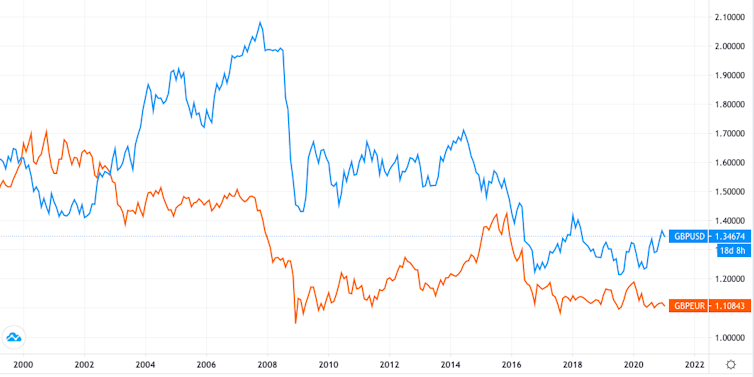Is the Uk Exclusively on Pounds Again
The Brexit deal has failed to have any major effect on the substitution charge per unit of the pound since January 1. The pound has held steady against the US dollar at United states$1.36 and has strengthened slightly against the euro to €1.12. This was very much consistent with the modest expectations of the markets. Only what about the longer term?
According to the research centre UK in a Irresolute Europe, the effect of Brexit on the economy is expected to emerge slowly, simply to be permanent. The centre estimates that Great britain's economy will compress past a total four.9% over xv years.
This is likely to add extra pressure on the pound, which has generally been weakening in contempo years. The question is how quickly the effects of Brexit are probable to feed through.
At the same fourth dimension, Brexit has played a function in undermining international investors' belief in the Great britain as a buoy of stability and trustworthiness and hence in a prosperous hereafter for the British economy. This too is likely to affect the currency over time.
The Brexit event
Sterling was already in an obvious downward trend against both the dollar and euro over the past couple of decades, as you can see from the chart below. Since the global financial crisis of 2008-09, this trend has accelerated because of the UK economic system'southward relatively slower productivity growth, despite the fact that it was running a very loose monetary policy. Incidentally, the pound has been falling faster against the euro than the dollar.
Sterling/USD and sterling/euro rates Jan 2000-December 2020

So where does Brexit fit in? Although the Brexit merchandise deal guarantees that appurtenances such equally nutrient, clothes, white goods and machines volition continue to trade without tariffs, there are caveats that are probable to undermine trade between the EU and UK – with potential consequences for the currency.
To qualify for null tariffs, goods need to satisfy the relevant rules of origin, which relate to where the items came from. For instance, a machine assembled in the United kingdom of great britain and northern ireland will authorize to be sold free of tariffs to the EU as long as 60% or more of its value was produced either in the Great britain or the European union.
The tweet, from Peter Foster, the public policy editor at the Financial Times, explains this concept, adding that companies are now realising what "rules of origin does to supply chains".
In addition to the rules of origin, merchandise in goods covered by the deal is simply tariff free as long as there is no significant divergence in terms of rules and regulations (the famous level playing field clause). This means that neither side is allowed to lower their standards if they want free trade to go on. If this led to divergence in UK standards over time, this could reduce the number of products that could be freely traded. However, it seems more likely that the UK will avoid diverging from EU standards and that as a result, more tariffs volition non be added here.
Overall, however, all merchandise models predict that international merchandise in appurtenances between the UK and EU will be reduced, given that Brexit creates new obstacles for the two trading partners and this is plush. As a effect, some import prices will increase and some export jobs will be lost.
Less merchandise with the EU, the biggest single market for the U.k., will imply reduced need for its currency and hence a lower value for the pound. This could too mean that UK firms face less competition domestically from EU exporters, which could cause productivity in Britain to further flatten. Reduced productivity for the UK could besides cause sterling to driblet in value as devaluation is and then the only alternative to maintain international competitiveness.
Services are even more than of import from the Great britain'south perspective. Led by areas similar finance and law, they brand up a meaning part of UK Gdp, and the EU is again the biggest single export market.
The Brexit deal does not include trade in services. The United kingdom of great britain and northern ireland and European union are still aiming to negotiate an agreement that will involve them. But with Paris and Frankfurt seeking a share of the UK's financial services business organization, a reduction in EU-UK services trade seems unavoidable.
Maintaining the same level of activity in the UK therefore looks uncertain in the curt term, and not without its issues in the long term – depending on whether there is an agreement on services in the next yr or and so. Considering services is the biggest part of the Great britain economy, a failure to accomplish such an agreement could reduce demand for sterling in European markets more than than anything else.
In sum, the Brexit bargain is probable to mean that sterling will continue its downwardly trend confronting the dollar and euro. This will affect everything from the price that people pay in British supermarkets to the cost of holidaying abroad. Information technology will not come equally a surprise if the euro equals a pound sterling over the adjacent two years and the dollar rate strengthens to US$1.20 to the pound.
Source: https://theconversation.com/brexit-uk-pound-has-not-crashed-yet-but-heres-why-it-will-probably-suffer-in-years-to-come-152646
Post a Comment for "Is the Uk Exclusively on Pounds Again"